Here’s a post I wrote for Karen May Dy’s Social Media Marketing blog on strategy, business and social media. I’d love to know what you think about it!
Author: Michele
Two types of boundaries, part 1
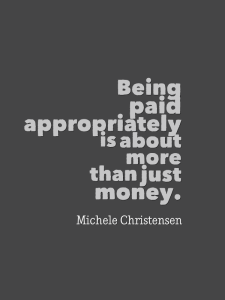 Part of being a successful solopreneur is knowing how to set good boundaries. The first type of boundary is what you let out, and that’s usually the first of the two types that solopreneurs have to learn about.
Part of being a successful solopreneur is knowing how to set good boundaries. The first type of boundary is what you let out, and that’s usually the first of the two types that solopreneurs have to learn about.

It’s easy to let too much out. Solopreneurs do this by giving too much away, doing more then they are paid for, underquoting, and doing too much for free. To be sure, some of this is good business. If you deliver more than you promise, you have a chance of wowing your customer. Occasionally allowing a call to go over for a few minutes to wrap up something great can make your client very happy. Pricing yourself low may work in the early days of your business to get those first few testimonials and references. Even giving away some of what you know for free can be a really effective strategy to let people check you out with no risk.
The problem happens when you do too much of any of these tactics or when you do them unconsciously. You can end up making it too hard on yourself to make a living. You can end up with a group of clients who don’t value you. You might find yourself painted into a corner and not able to scale back to more reasonable deliverables. You run the risk of attracting only people who want free or impractically low-priced products and services.
A bigger risk is burning yourself out and coming to resent the business you once loved. It feels terrible to do work that is valuable and not have that work recognized. It can make a person lose enthusiasm and not even know why. Some people like to picture money as energy, and when someone pays you for your work it’s an exchange of energy. Being paid adequately can help the exchange feel equal and help keep you motivated and charged up to serve other customers.
Letting too much out may not even serve your clients as well as you would like to. If you try to tell a person everything you know in one consultation, they’ll probably be overwhelmed and not get as much out of it. If you charge too little, people may not take you seriously and may overlook what you offer. Clients may not use what they purchased if it was too cheap.
Why do people let too much out? There are probably more reasons than I could ever list, but here’s a few to consider:
- They are new in business. It can be hard to charge a decent rate when you’ve got no track record, references or testimonials.
- Fear. It can be scary to quote a price that may drive some people away.
- Lack of belief in their own value. If a person isn’t clear about the value of what they deliver, they may not feel comfortable charging enough for it.
- A desire to help. Many solopreneurs would do their work for free if they could, so they feel funny charging for it.
- Not setting good limits on requests for free help. Watch those “Can I buy you a coffee and pick your brain?” requests, they can kill your bottom line.
What challenges have you overcome in this area? How did you let too much out and what did you do about it? Tell me about it in the comments.
(For Part 2 of this series, click here.)
Featured article on Twitter strategies in emPower Magazine
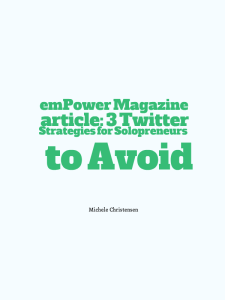 I had an article published this month by emPower Magazine, which is “an online magazine that offers in-depth articles, commentary and video programming on social, educational, socio-economic, health, political and environmental issues facing people of African descent” (Source)
I had an article published this month by emPower Magazine, which is “an online magazine that offers in-depth articles, commentary and video programming on social, educational, socio-economic, health, political and environmental issues facing people of African descent” (Source)
The article is on Twitter strategies that solopreneurs should avoid. Check it out here, and I’d love to see your comments!
Begin your day the night before
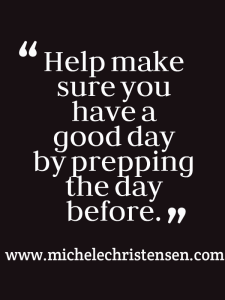 One of the biggest factors in whether or not I have an enjoyable, productive day is how I end the day before. As a solopreneur, your personal life and business life tend to blend together, so some of these ideas relate to non-work things.
One of the biggest factors in whether or not I have an enjoyable, productive day is how I end the day before. As a solopreneur, your personal life and business life tend to blend together, so some of these ideas relate to non-work things.

Do a little planning
One of my biggest productivity killers is staring at my to-do list and trying to figure out what to work on before I’ve even gotten anything done. I have a hard time getting into gear when I have to wade through dozens of tasks just to figure out what to do before I can even do anything. To combat this, I get my tasks and priorities lined up the night before. It’s the last work item I tackle for the day, so at whatever time I decide to quit for the day I spend 5-10 minutes making sure I can hit the ground running the next day.
Know when to quit
As a solopreneur, you to-do list is massive and never-ending. You’ll never get it all done, so a big part of your time management has to be deciding what doesn’t get done. Part of this is knowing when to stop working for the day. Quite literally, you could be up all night and not get it all done or even feel on top of things, so it’s important to have a set time at which you stop working. When I work in the evenings I try to make sure I have a set quitting time that gives me time to end my day, relax and get to bed on time.
Park on a downhill slope
This means that you leave your work in a condition that makes restarting easy. In the time leading up to quitting time, try to find a good place to stop. If there is no good place to stop, make sure to leave yourself some notes so you can jump back in without figuring out where you were. You’d be surprised how much you can forget in one day, and spending 30 seconds leaving yourself well-positioned to restart can save many minutes of headaches later.
Have an end-of-day routine
Make a short list of what you need to do at the end of the day to start your next day off right. Once you’ve wrapped up work, consider what personal chores would make your next morning run smoothly. I like to set up my coffee the night before, and sometimes I set up a load of laundry so I can start it as soon as I get up. You might want to pack your lunch, lay out your clothes or pack your bag for an early meeting. Doing these tasks the day before can help you have less-hassled morning.
Sketch out a schedule
Be sure to peek at your schedule for the next day so you’re not caught unaware of an early obligation. Create a rough outline of what you’ll be working on during which time windows. You can always change your mind, but having a plan gives you something to work from.
What else?
What do you do at the end of the day to ensure a strong start to the next day? Share it in the comments.
Email marketing as part of your CRM (Customer Relationship Management)
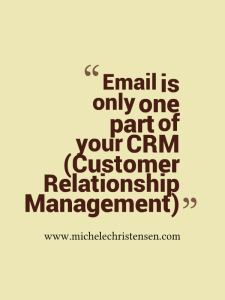 I was in a training recently, and the trainer used the phrase “CRM software” and “email list service” interchangeably. Aside from being imprecise, I thought that mixing these two terms could easily lead someone to that dreadful practice of adding people to their newsletter list without consent, although the trainer clearly was against this idea.
I was in a training recently, and the trainer used the phrase “CRM software” and “email list service” interchangeably. Aside from being imprecise, I thought that mixing these two terms could easily lead someone to that dreadful practice of adding people to their newsletter list without consent, although the trainer clearly was against this idea.
What you can and cannot choose
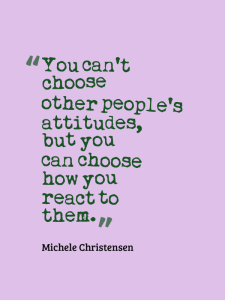 There are some things in business and in life you have a choice over, and some you do not. One of the biggest of these is how other people act. You simply cannot make their choices for them. You also cannot choose their attitude. What you can choose though is how you interact with them.
There are some things in business and in life you have a choice over, and some you do not. One of the biggest of these is how other people act. You simply cannot make their choices for them. You also cannot choose their attitude. What you can choose though is how you interact with them.

Many people are very negative and have an attitude that doesn’t support their own success or yours. A lot of people like to blame outside forces for their situation instead of doing the best they can within whatever those outside circumstances are.
As you make the journey up the entrepreneurial mountain, many people will try to stop you, dissuade you and discourage you. They may be people you like or even love, and they may not even know they are doing it.
It’s not necessary to cut ties with everyone you know, but it does pay to monitor the effect being around negative people has on you. It may be harder to maintain a positive outlook and take personal responsibility for your life if most of the people you spend time with don’t. It may be hard to shake off the effects of that draining interaction and get back to work.
Assuming you don’t want to ditch everyone you know, how can you handle negative people with the least impact on yourself?
You may want to invite some new personal and business connections into your life. Having new people who share your positive outlook will leave less space for the negative people. It will also provide you with some uplifting energy to counterbalance the negativity.
Spending more time with positive, successful people will change you and make you more like them. The negative people in your life may come along with you or they may naturally select a smaller role in your life since you don’t have as much in common.
You may want to place some limits on the negative people in your life. Limit how much time you spend together, what you talk about or how much time you spend talking about your business and life. It’s always important to be polite and not deliberately hurt other people’s feelings, but if someone is hurting your success don’t be afraid to set some limits in a kind and gentle manner.
If you think there’s value to it, you can call the behavior to the person’s attention. I caution against this though unless you sincerely believe it will serve the other person and you think they actually want to learn and grow. Don’t confront a negative person for your own benefit. You’ll end up frustrated and probably make the other person mad.
What choices do you make when dealing with negative people? Tell me about it in the comments.
What is double-entry bookkeeping?
I was asked this question 2 times recently, so that means it’s time to blog about it!
I may not be the best person to answer this, but I will try to make it understandable especially since most solopreneurs I know (including myself) don’t relish doing their bookkeeping. When I worked for corporate, and one of my roles was to interpret numbers for operations people so I do enjoy making the complex into something useful. Disclaimer: this is not meant to take the place of advice from your legal or financial professional and should not be construed as advice. It’s also not meant to be an exhaustive, comprehensive explanation but more of something to think about.
First, why is it important to know what double-entry bookkeeping is? It’s something that describes the capability of any bookkeeping software you might use and this may impact how much work your accountant has to do to prepare taxes or financial statements. It also gives you the ability to get a wider variety of data from you bookkeeping records than a system that doesn’t follow this convention.
So what is it?
Double-entry bookkeeping is a way to keep the records of the company that supports the idea that a business has assets (one side of the double entry), and that two groups of people have claim to those assets (the other side of the double entry). The first group is creditors or people the business owes money to. The second is the owner or owners. Another way to look at is that the owners share in the business is what’s left over after debts are subtracted from assets. Many transactions effect both sides, but some will only effect one side.
For many solopreneurs, it’s fine to just measure financial health based on cash. Cash comes in and goes out, and you categorize it and get your data from there. For other businesses though, this would not present a full picture. Categorizing your cash in and out could be a simple form of double entry accounting.
For example, let’s say a business signs a 3-month contract to do tech support for a customer and gets a $3,000 check on the spot. When the business owner leaves the customer’s place of business and deposits the check into his or her bank account, the business’ cash has gone way up but they haven’t actually done anything to be entitled to the income represented by the contract. At the end of month one, they’ve earned $1,000, another $1,000 by the end of month 2 and the final $1,000 at the end of month 3. The advantage of looking at this transaction this way is that it lets you know when you’ve earned the income not when the cash came in, although cash flow is important too. Treating the contract this way also allows you to match the revenue more closely to the period of time over which you have expenses relating to earning that income.
What system of bookkeeping do you use? Tell me about it in the comments.
Don’t do more than your client wants
 This article is about doing what the client has hired you for and wants you to do, and not veering so far afield as to offend them. I’ve been turned off on more than one occasion by people who felt that their status as “expert” in one area entitled them to speak to all areas of another person’s life. To say I advise against this would be putting it mildly! It’s happened a few times, but here are two of the most out-of-line people I’ve encountered.
This article is about doing what the client has hired you for and wants you to do, and not veering so far afield as to offend them. I’ve been turned off on more than one occasion by people who felt that their status as “expert” in one area entitled them to speak to all areas of another person’s life. To say I advise against this would be putting it mildly! It’s happened a few times, but here are two of the most out-of-line people I’ve encountered.
A few years ago when I was still new to the internet side of my business, I signed up for a free strategy session with a successful guru and at our designated time she proceeded to criticize and pick apart areas of my life that have nothing to do with my business. At the time, I was not devoting 40 hours a week to my business, and this was a decision my husband and I made together and it suited both of us at the time for a number of reasons that aren’t that noteworthy now. She criticized and gave advice on how I spent my time, my business goals, and of all things, my fixer upper house! At the time, I was so surprised I couldn’t really respond but suffice it to say I immediately cut off all contact with her and would never recommend her or use her services. Yes, I should have stepped in and put a stop to it as soon as she got off topic, but the fact that she was so presumptuous and spoke on things she had no knowledge of was enough for me to know I’d never interact with her again.
The second example was during a training. We were working in pairs trying to help each other, and I told my partner that I hadn’t been able to sell the packages she suggested for me. She immediately jumped into some nonsensical “advice” about changing who I am so people would buy the packages, saying that something was wrong with who I am or the packages would be selling, etc. Now for sure, mindset plays a big role in business but this exercise was not about mindset and the workshop was not a psychological one. She went way outside what she was asked to do and what she said would have been insulting if I had taken her seriously. What I did instead was add her to the list of people I’d never work with, partner with or refer to.
Here’s the tricky part of this – you probably weren’t always in the business you are now. You probably have tons of skills and knowledge that would benefit the people who have hired you for whatever you now do. However, when someone hires you they’ve given consent for you to give advice on the topic they’ve hired you for. If you go too far afield, you run the risk of offending and alienating them. My suggestion is to ask permission first. If they want your advice, they’ll tell you. If not, you’ve shown respect by asking and they’ll tell you no.
How to stay on track
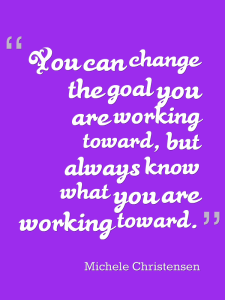 Someone asked me a question recently, and I thought it was such a great one that I decided to answer it here. I was at a training, and when I mentioned that I coached entrepreneurs, the person I was talking to asked me “How do you keep them on track? Entrepreneurs, myself included, are always changing gears.”
Someone asked me a question recently, and I thought it was such a great one that I decided to answer it here. I was at a training, and when I mentioned that I coached entrepreneurs, the person I was talking to asked me “How do you keep them on track? Entrepreneurs, myself included, are always changing gears.”
It’s a great question because he’s right – entrepreneurs are naturally drawn to new ideas and possibilities – bright, shiny objects anyone? Enthusiasm for new ideas is one of an entrepreneur’s greatest gifts and also one of the greatest challenges. Nobody goes into business with the desire to be bored.
Let me share a little of my philosophy first – I don’t “keep” people on track, because that implies force or power and I don’t believe entrepreneurs want or need that. Entrepreneurs are naturally motivated and love results, so guidance and perspective are better tools than force for entrepreneurs.
What I do is help business owners get clear on what they want to accomplish and how to get there. As they move forward, we tackle roadblocks together. When the inevitable “next big thing” pops up, I remind them of where they said they wanted to go and we assess if this new thing fits into that goal. If it does, we figure out how to fit it into the current plan. If it doesn’t, we talk about whether or not the original goal still fits. The beauty of running your own business is that you get to decide what the goals are and when to change them.
A word of caution – if you change your goals too often, you may end up never reaching them. I think this is one of the biggest hurdles entrepreneurs face – being able to stay with something after it gets boring but before it produces results. Most new projects go through the “darkest before the dawn” phase where the newness has worn off and finishing the project becomes a slog through tedium to get to the finish line. This is the worst time to give up – when completion is just around the corner.
This is a great example of how strategy and planning in a business pay off. If you start with a goal and a plan to get there, you have a criteria against which to weigh any potential new ideas. If the new idea fits, then use it. If it doesn’t, you have the option of changing your goal or your plan but do it intentionally and not because you got bored.
How to schedule your day for flexibility and productivity
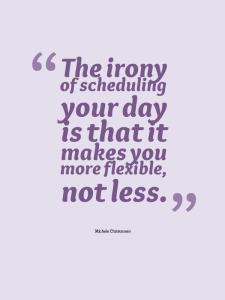 In my last post, I talked about how to keep your personal life from getting in the way of your business success. This post is about how to schedule your day to accommodate both business and personal tasks while being flexible and productive.
In my last post, I talked about how to keep your personal life from getting in the way of your business success. This post is about how to schedule your day to accommodate both business and personal tasks while being flexible and productive.
First, it’s important to commit to a practice of scheduling your day, so let me explain some of the benefits. You’ll be able to get a clear view of what you did and did not get done in a day and adjust your next day accordingly. You’ll be able to look at a bird’s eye view of the 16 or so waking hours you have available and decide how to use them based on your current priorities. If you don’t already have it, you’ll get a sense of when is a good time of day for different activities. You’ll keep activities that tend to expand, like social media marketing, down to an appropriate amount of time. You’ll be able to prioritize the few things that you really need to get done.
I do this as part of my end-of-day routine when things are fresh in my mind. For some reason, having my day laid out before I wake up lets me hit the ground running. If I’m feeling bad about something I didn’t get done, I can put it on my schedule for the next day and let it go for the night. Of course I give in to temptation and skip my scheduling sometimes, and I always pay the price the next day.
You can put your schedule wherever it suits you – paper, spreadsheet, day planner, etc. I like to use a spreadsheet with one line per activity with start and end times. I would not recommend your main calendar – this is far more detailed than would fit on most calendars.
I always start my day with the same things. I’m best in the morning, so those first few hours are set aside for high-priority projects, and that means whatever is most important to be working on will get some uninterrupted high-quality time before anything else can get in the way. Consider putting in some time on high-priority work even before you check email or other messages.
Next, add in the “big rocks,” i.e. those big things you have to work around like appointments, meals, errands, fitness, etc.
Designate some time for personal tasks and for miscellaneous business tasks and handling email, messages, mail, etc.
Schedule in your breaks with a start and end time. Taking breaks is critical to being productive, but you do need to set an end time or it’s too easy to waste a lot of time.
Just like the first few hours of the day are set, so should the last few. Give yourself some time to wrap up your day, schedule the next day, do any before bed tasks, and finally some time to relax so you are in low gear when it’s time to go to bed.
Sounds great, right, except for inevitable last-minute things that pop up? The irony is that having a schedule helps you to be more flexible. You have a plan to deviate from. You know what you are giving up (or have to make up) if you say yes to something new. Being your own boss means that not only do you make your schedule, but you can change it too.
How do you schedule your day? Does it help you to be more flexible? Tell me about it in the comments.